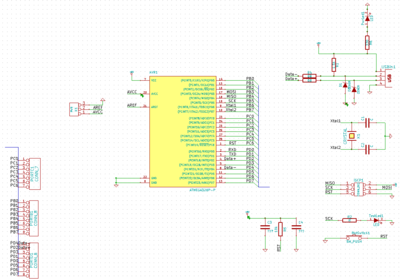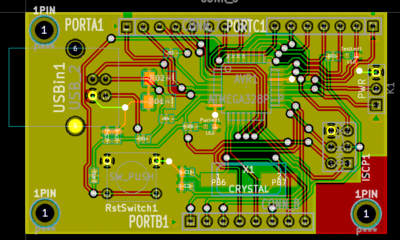Projets:Perso:2013:PlatineAvrUSB
From Electrolab
| Platine de test AVRUSB | |
|---|---|
| Auteur | Jnat |
| Date de proposition | 20/02/2012 |
| Tags du projet | usbhid; |
| Lieu d'utilisation final | @Work/Home |
| Utilisateur final | Tout le monde |
| Type de projet
Projet personnel de Jnat | |
|
Platine AVRUSB
Vue d'ensemble
Le projet Avr Usb permet de créer des périphériques USB a partir d'un microcontrolleur AVR. Il est aussi possible de faire tourner le firware sur un arduino. Documentation sur [[1]]
Solution choisie
J'ai opté pour le montage qui utilise des diodes Zener a l'envers pour abaisser la tension du bus usb a 3.3v.
"Instead of reducing the AVR's power supply, we can limit the output voltage on D+ and D- with Zener diodes. We recommend 3.6 V low power types, those that look like 1N4148 (usually 500 mW or less). Low power types are required because they have less capacitance and thus cause less distortion on the data lines. And 3.6 V is better than 3.3 V because 3.3 V diodes yield only ca. 2.7 V in conjunction with an 1.5 kΩ (or more exactly 10 kΩ) pull-up resistor. With 3.3 V diodes, the device may not be detected reliably."
En gros il vous faut deux diodes zener 3.6v 0.5W Le microC est un ATMEGA328P (ou PU).
Driver AVR USB
A changer dans le main afin que les ports utilisés soient les bons:
#define LED_PORT_DDR DDRB #define LED_PORT_OUTPUT PORTB #define PWM_PORT_OUTPUT PORTD #define PWM_PORT_DDR DDRD #define ONBOARDLED_BIT 5 #define LEDRED_BIT 4 #define LEDGREEN_BIT 2 #define LEDBLUE_BIT 3 #define LEDRED_PWM 5 #define LEDGREEN_PWM 6 #define LEDBLUE_PWM 3

